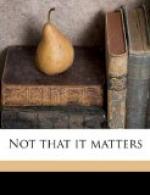A woman, who had studied what she called the science of calligraphy, once offered to tell my character from my handwriting. I prepared a special sample for her; it was full of sentences like “To be good is to be happy,” “Faith is the lode-star of life,” “We should always be kind to animals,” and so on. I wanted her to do her best. She gave the morning to it, and told me at lunch that I was “synthetic.” Probably you think that the compositor has failed me here and printed “synthetic” when I wrote “sympathetic.” In just this way I misunderstood my calligraphist at first, and I looked as sympathetic as I could. However, she repeated “synthetic,” so that there could be no mistake. I begged her to tell me more, for I had thought that every letter would reveal a secret, but all she would add was “and not analytic.” I went about for the rest of the day saying proudly to myself “I am synthetic! I am synthetic! I am synthetic!” and then I would add regretfully, “Alas, I am not analytic!” I had no idea what it meant.
And how do you think she had deduced my syntheticness? Simply from the fact that, to save time, I join some of my words together. That isn’t being synthetic, it is being in a hurry. What she should have said was, “You are a busy man; your life is one constant whirl; and probably you are of excellent moral character and kind to animals.” Then one would feel that one did not write in vain.
My pen is getting tired; it has lost its first fair youth. However, I can still go on. I was at school with a boy whose uncle made nibs. If you detect traces of erudition in this article, of which any decent man might be expected to be innocent, I owe it to that boy. He once told me how many nibs his uncle made in a year; luckily I have forgotten. Thousands, probably. Every term that boy came back with a hundred of them; one expected him to be very busy. After all, if you haven’t the brains or the inclination to work, it is something to have the nibs. These nibs, however, were put to better uses. There is a game you can play with them; you flick your nib against the other boy’s nib, and if a lucky shot puts the head of yours under his, then a sharp tap capsizes him, and you have a hundred and one in your collection. There is a good deal of strategy in the game (whose finer points I have now forgotten), and I have no doubt that they play it at the Admiralty in the off season. Another game was to put a clean nib in your pen, place it lightly against the cheek of a boy whose head was turned away from you, and then call him suddenly. As Kipling says, we are the only really humorous race. This boy’s uncle died a year or two later and left about 80,000, but none of it to his nephew. Of course, he had had the nibs every term. One mustn’t forget that.
The nib I write this with is called the “Canadian Quill”; made, I suppose, from some steel goose which flourishes across the seas, and which Canadian housewives have to explain to their husbands every Michaelmas. Well, it has seen me to the end of what I wanted to say—if indeed I wanted to say anything. For it was enough for me this morning just to write; with spring coming in through the open windows and my good Canadian quill in my hand, I could have copied out a directory. That is the real pleasure of writing.




